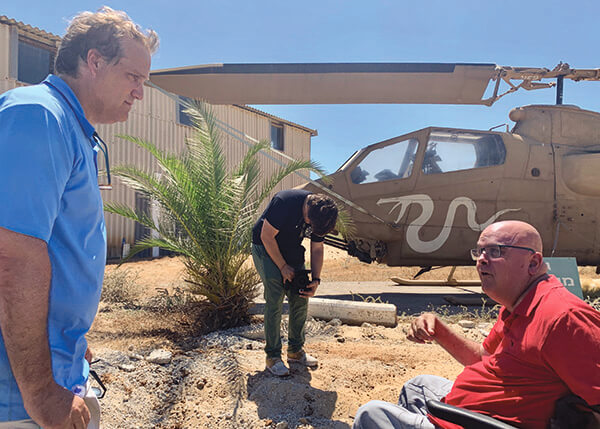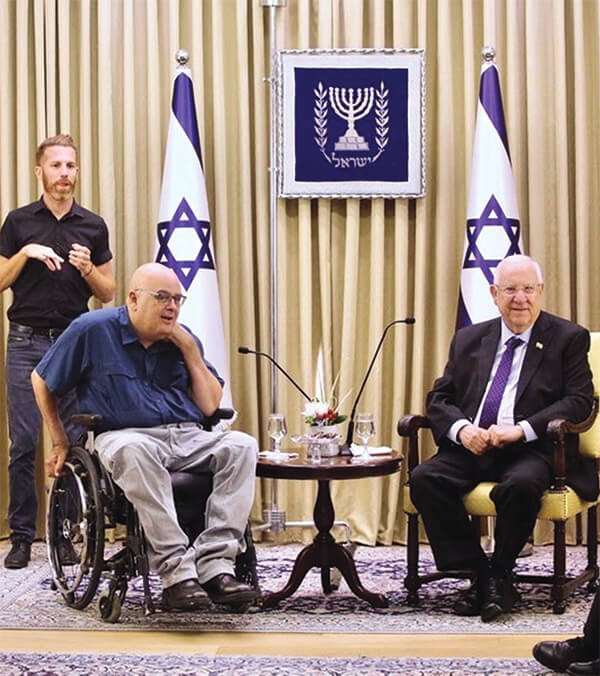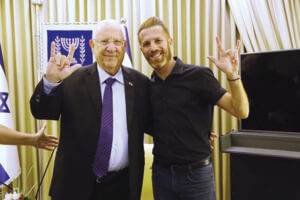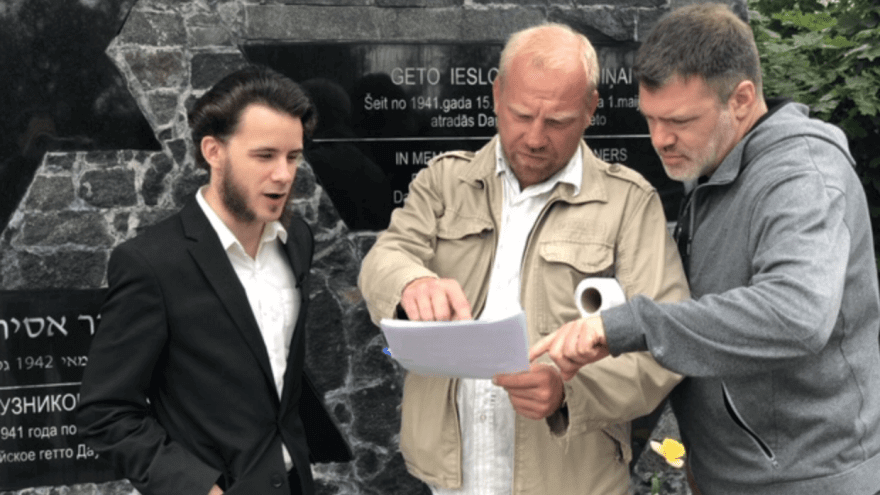Original Article Published On The Jewish Imagine Magazine
In 20 short years, Israel, the Start Up Nation, is on the road to becoming Israel, the Accessible Start Up Nation.
Thanks to two Israeli presidents, a determined IDF Lieutenant-Colonel paralyzed in a Cobra helicopter crash, the Access Israel organization, and the newly formed Friends of Access Israel (FAISR), the world now looks to Israel as a model in accessibility, services and sensitivity to people with disabilities.
When Yuval Wagner was a child, he and his siblings helped take care of a father who used a wheelchair. They often carried him, as Israel was not accessible at the time. Wagner grew up and served as an Israel Air Force combat pilot. In 1987, at the age of 22, he and his squad were on a training exercise. The helicopter’s rotor malfunctioned, and all on board were killed—except for Wagner—he became a person with quadriplegia.

in front of a Cobra helicopter
Following a long rehabilitation, Wagner returned to the Air Force, completed his degree in business management, got married and started a family. In the late 1990’s, the Wagners were excited to go on a vacation in the north of Israel. His wife made calls to make certain the accommodations were accessible. When Wagner arrived, he learned that the bathroom was not accessible.
He was frustrated, angry and determined. In 1999, he dashed off a letter to Israel’s President at the time, Ezer Weizman, a former combat pilot, commander of the Israeli Air Force and Minister of Defense. Weizman, the 7th president of Israel, invited Wagner to meet in person, where he apologized for Israel’s lack of accessibility, ordered him to start an NGO (non-governmental organization) to provide accessibility for the disabled and elderly, and invited Wagner to attend an official opening of the soon-to-be new organization in the main hall of the president’s residence.

at Beit Hanasi, President Rivlin’s home
The new organization would be known as Access Israel. The organization continues to grow, evolve, and lead the way for accessibility in Israel and around the world.
“We are the only Israeli organization that focuses on accessibility and inclusion—not only for people in wheelchairs, not only for people who are blind or who have hearing impairments—but for all kinds of disabilities and in all fields of life,” reported Wagner. Access Israel strives to integrate people with disabilities into all parts of Israeli society by focusing on dignity, equal rights, and maximum independence.
The organization has dramatically improved accessibility for thousands of Israelis, by promoting accessible environments, increasing awareness, and helping draft laws and regulations. Access Israel has helped make it possible for wheelchair users to access such tourist attractions as the Old City of Jerusalem and the Western Wall.
Alan T. Brown, the Director of Public Impact for the Reeve Foundation in the United States and a person with quadriplegia, can attest to Jerusalem and Israel’s efforts to increase accessibility. Several years ago, Brown met Access Israel CEO Michal Rimon, expressed his desire to visit Israel, and shared concerns about lack of accessibility. Rimon enthusiastically invited Brown to Israel where he experienced accessibility first hand. “Something like this has to be done in America—something that is proactive and aggressive in attaining accessibility for all. I even went on the tour under the Kotel walls in a wheelchair!”

Brown experienced Israel’s advances in both physical accessibility and in leading the way in changing attitudes towards people with disabilities. “I am amazed at how Israel is using more than ramps to include the disabled. They are also doing it through corporate sensitivity training.”
Brown contacted his lifelong friend, Jamie Lassner and said, “In Israel they do it with much more dignity and we need to bring that worldwide. Jamie, are you in?” Brown and Lassner have been instrumental in starting Friends of Access Israel, which will help share the work of Access Israel more widely, and will help Wagner realize his goal of having the world view Israel as the Accessible Startup Nation.
A recent gathering in Jerusalem celebrated the 20th anniversary of Access Israel. Israel’s President Reuven Rivlin, members of Knesset, Access Israel staff and supporters, and leaders of the newly created Friends of Access Israel celebrated the organization’s strides in services, technology, education and advocacy on behalf of people with disabilities.
Rivlin congratulated Wagner and Access Israel for their “tenacity, futuristic vision, and drive for making Israel one of the most accessible countries in the world.” He acknowledged that the organization is improving the lives of people worldwide and spoke personally about how his late wife, who became disabled later in life, and benefitted from the work of Access Israel.
Michal Rimon addressed the gathering, “When I joined Access Israel 12 years ago, we were a small organization with a big goal—to break through barriers and enable people with disabilities to dream and fulfil their dreams.” Rimon, Wagner, and CFO Rani Benjamini have consulted internationally on accessibility and have shared the work of Access Israel at conferences in Russia, Spain, Latvia, Austria, and Ecuador. It is one of four organizations which advise the United Nations Convention on the Rights of Persons with Disabilities (CRDP).

Rimon is excited to collaborate with FAISR and its Executive Director, Jamie Lassner. This new organization has already launched a well-attended sensitivity training dinner at NYU, cohosted by Realize Israel. They are planning such programs as Accessibility Accelerating Sensitivity Training Trips to several North American cities, Accessible Group Tours of Israel, Expeditions and The FAISR Accessibility Accelerator Tech Conference. Through these initiatives, organization leaders will travel to communities in the US to increase awareness of accessibility and inclusion, they will offer accessible Israel trips, climb Mount Kilimanjaro and host a conference which promotes accessible Israeli technologies.
Jamie Lassner served for several years as Director of Student Life at Magen David Yeshivah Elementary School. He learned of the work of Access Israel through Brown and through a visit to Israel last summer.
“I was amazed by the global difference they were making with their proactive strategies and programs. They had no global boundaries and a robust all-inclusive mission to gain equality and access for all disabled and elderly persons,” said Lassner who then decided to create FAISR. “As they say, the rest is history!” Lassner and board members Alan Brown and Abraham Eisenstat, friends from their many years, credit their late fathers for inspiring their work with FAISR. “They always made sure that all individuals coming into their community felt welcome.”
Rimon looks forward to collaborating with her American counterparts. “We also can’t ignore a sense of Israeli pride as we serve as an example to the whole world and unite on a common global issue. We have already learned a lot from our FAISR partners and find ourselves looking towards the future with great excitement at the vital things we will accomplish together.”
Wagner added, “L’Chaim and Ya’alah” (onward) on our joint global goal to change the quality of life for the biggest minority of the world—the disabled. Together we are going to do amazing things for accessibility and inclusion, both in Israel and America.”
At the 20th Anniversary gathering, FAISR received a welcome endorsement from President Rivlin. “Our friends from abroad, from the United States—Welcome! We appreciate very much what you are doing, because this is a humanitarian need for everyone to respect human beings as human beings, not only as an Israeli or American, Brit, or Russian. We appreciate your cooperation and partnership. G-d Bless You!”
FAISR is a non-profit United States based 501-3C organization. You can follow then on Instagram: @f.Aisr, or on facebook: faisr.Org. For more info, email info@faisr.Org










